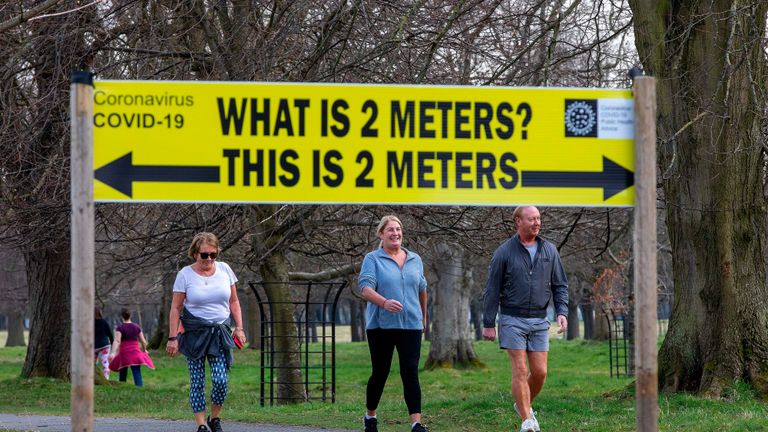Coronavirus: Ireland's PM announces six-week lockdown - 'If we pull together, we'll be able to celebrate Christmas'
Micheal Martin said Ireland's new measures are "probably Europe's strictest regime".
Tuesday 20 October 2020 00:43, UK
Ireland will return to the highest level of coronavirus restrictions from midnight on Wednesday - with the prime minister suggesting the country will be able to celebrate Christmas "in a meaningful way" if the new lockdown is taken seriously.
Micheal Martin warned that the evidence of a potentially grave situation in the weeks ahead is now "too strong" to ignore and the current restrictions are "not enough".
He asked everybody in Ireland to take the threat of COVID-19 seriously - and stressed that a "herd immunity" approach is not possible.
Mr Martin told the nation in an address on Monday: "If we all pull together over the next six weeks, we will have the opportunity to celebrate Christmas in a meaningful way.
"It won't be the same Christmas as we have enjoyed in years past, but if we follow the spirit of these new rules, it will be a very special time and give us some respite from the hardship of the past seven months."
Despite describing the new "Level 5" measures as "probably Europe's strictest regime", the Irish leader said that a full lockdown is "simply not a realistic option" and some exceptions will be made.
Although non-essential shops will be forced to close, and bars and restaurants will only be able to operate on a takeaway-only basis, schools and childcare facilities won't be affected.
Mr Martin also said it is "essential" the construction industry is allowed to continue, and he confirmed that most manufacturing sites will also remain open.
The Taoiseach vowed to extend financial support for individuals and businesses - and to prioritise the rollout of mental health services.
Under the Level 5 plan, no social or family gatherings are allowed to take place indoors or outdoors and weddings will remained capped at 25 people until the end of the year.
Mr Martin said: "I understand and I feel very personally and profoundly, the disappointment, the feelings of loneliness, perhaps even despair that this announcement will bring to many."
He acknowledged that "social isolation and anxiety is a real issue for many people", entitling those who live alone to form a "support bubble" with another household.
The prime minister continued: "These are the toughest of times, but the Irish people will persevere. We will suppress this virus and we will emerge from these restrictions on 1 December."
The new rules will come as a blow to Ireland's hospitality sector.
One restaurateur, Paul Cadden, has said he will "have to lay off 20 staff in the coming days".
Reacting to the announcement, the owner of Dublin's Saba chain told Sky News: "The whole industry is really shocked tonight, although it had been on the cards all day. The industry put the shoulder to the wheel and helped flatten the curve throughout this, so it's a really tough blow."
The government is thought to have been influenced by a letter from the National Public Health Emergency Team (NPHET) which suggested a three-week lockdown wouldn't control the virus for very long.
According to reports, NPHET advised a six-week lockdown would keep the virus at bay for the month of December including Christmas.
Ministers are hoping the restrictions will ensure businesses are up and running by the festive period.
Analysis: By Ireland correspondent Stephen Murphy
Just two weeks ago, the Irish government rejected expert advice to move to Level 5 restrictions. That now looks like a bad error in judgement.
In the past fortnight, the surge in Irish COVID-19 cases has gathered pace with frightening speed. In the last week, the record for daily cases in Ireland has been broken four times.
The National Public Health Emergency Team (NPHET) had no choice but to again urge the government to go to Level 5 - but now for a longer period of six weeks. This time, the government has acquiesced.
Parallels are inevitably being drawn with Ireland's harsh lockdown of the spring. But the new restrictions differ in their scope, with schools to be kept open and protections for industries like construction.
It's not quite as bad as the first lockdown, and the Irish government certainly won't use the word, but try telling a weary public that as the winter kicks in, and families are kept apart, businesses go to the wall, unemployment soars and people are kept to a 5km radius of home on pain of being fined.
If it looks like a lockdown and talks like a lockdown, the odds are… it's another lockdown.
Will it be worth it? Well, the government has been forced to take this drastic step due to those soaring case numbers, as well as the growing pressure on the health system, at a time of the year when it comes under immense strain at the best of times.
The public, for the most part, can see the rationale behind this move. What it wants now is a cogent, and well-communicated, exit strategy. There has to be an end in sight.
And the question will linger for Micheal Martin's government: If they had taken the expert advice a fortnight ago, could this have been avoided?





